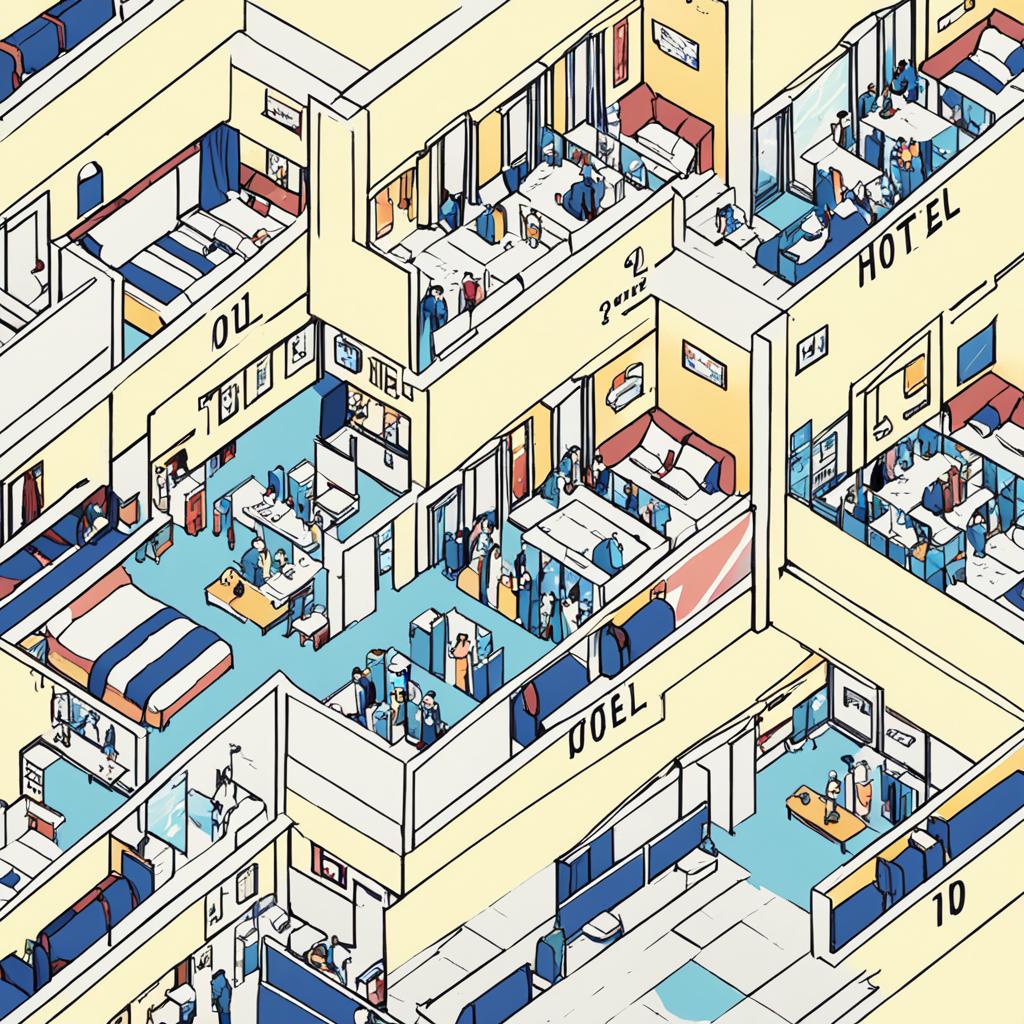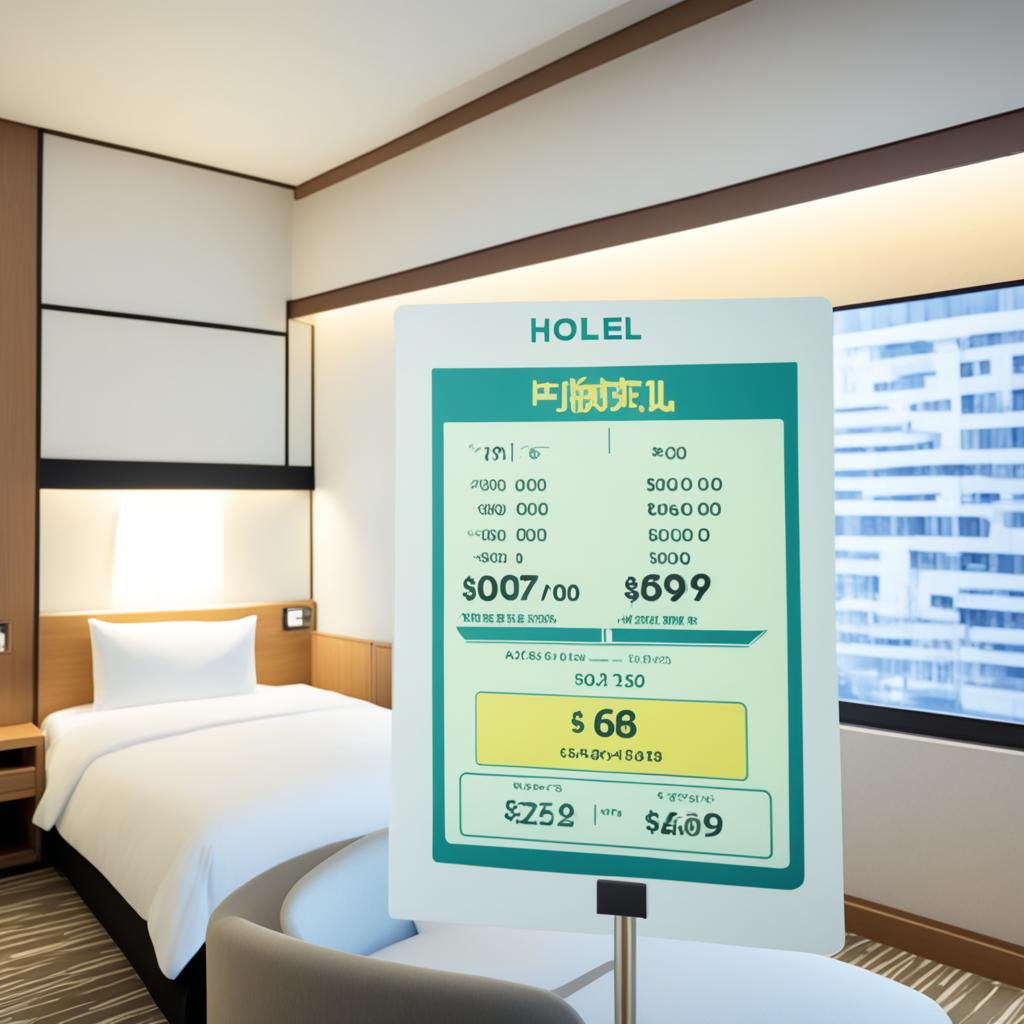When it comes to booking a hotel, one question that often arises is whether hotels charge per person or per room. Have you ever wondered about this yourself? Does it surprise you to learn that in most cases, hotels charge per room rather than per person?
While this may be the common practice, there are various factors that can influence the charging policy. Hotel policies, occupancy limits, as well as the number of guests involved can all play a role in determining how hotels charge for accommodations. So, it’s important to understand these factors to ensure a smooth booking process and avoid any unexpected charges.
Curious to know more about why hotels ask for the number of guests and how it affects your stay? Interested in understanding the allowed number of guests in a hotel room and what happens when there are more than two occupants? Want to find out the best tips to avoid extra person charges?
Stay tuned as we delve into these questions and provide you with all the information you need to know about hotel charges and accommodations. Learn insider tips, debunk common misconceptions, and discover strategies to ensure a comfortable and cost-effective stay. Get ready for an enlightening journey into the world of hotel bookings!
Are you ready to uncover the truth about hotel charges? Let’s get started!
Why Do Hotels Ask for the Number of Guests?
When making a reservation at a hotel, you may have noticed that they ask for the number of guests staying with you. You may wonder why this information is necessary. Well, let’s explore why hotels ask for the number of guests and why it’s important for both you and them.
Many hotels ask for the number of guests to better understand your accommodation needs. By knowing the number of guests, hotels can determine the appropriate room type based on occupancy limits. This ensures that you have enough space to comfortably enjoy your stay.
Additionally, hotels allocate resources and amenities based on the number of guests. For example, if you are traveling with children, the hotel may provide extra beds or cribs. By knowing the number of guests, hotels can make the necessary arrangements to enhance your experience during your stay.
Moreover, hotel personnel also take guest safety and compliance with local regulations seriously. By having information about the number of guests, hotels can ensure that the room you are assigned meets safety standards and complies with local regulations.
Overall, providing the number of guests when making a reservation allows hotels to cater to your specific needs and ensure a pleasant and comfortable stay. It’s a way for hotels to allocate resources appropriately and provide the best possible experience for their guests.
Image: A group of smiling hotel guests enjoying their stay.
| Reasons Why Hotels Ask for the Number of Guests |
|---|
| Allocate appropriate room type |
| Provide suitable resources and amenities |
| Ensure guest safety |
| Comply with local regulations |
Allowed Number of Guests in a Hotel Room

The number of guests allowed in a hotel room can vary depending on several factors, including occupancy limits, hotel policies, local regulations, and the size of the room. In general, hotels have standard occupancy limits for each room type to ensure the comfort and safety of their guests.
For example, a standard double room typically has a maximum occupancy of two adults. This means that the room is designed to accommodate two adults comfortably with the available amenities and space. Exceeding the maximum occupancy can result in discomfort and may violate hotel policies. It’s important to consider the number of guests when making a reservation to ensure that the room meets your needs.
However, it’s worth noting that some hotels offer additional beds or rollaway cots for extra guests, usually at an additional charge. This allows the room to accommodate more guests while still maintaining its standard occupancy limits. It’s advisable to inquire with the hotel about the availability and cost of these additional bedding options if you have more guests than the standard occupancy limit.
Understanding the allowed number of guests in a hotel room is crucial to ensure a comfortable stay and comply with hotel policies. By providing accurate information about the number of guests during the booking process, you can avoid any issues during check-in and enjoy a seamless experience.
An Example of Occupancy Limits for Different Room Types:
| Room Type | Maximum Occupancy |
|---|---|
| Standard Double Room | 2 adults |
| Standard King Room | 2 adults |
| Junior Suite | 3 adults |
| Family Suite | 4 adults |
Two People in a Room Booked for One
In many cases, hotels do allow two people to stay in a room booked for one. However, it’s important to communicate this requirement accurately during the booking process to ensure the appropriate room assignment. By providing accurate information about the number of guests, you can help hotels make necessary arrangements for a comfortable stay.
Depending on the hotel’s policy, there may be an additional fee for the second guest staying in a room booked for one. This fee might cover the cost of an extra bed or additional amenities provided. However, some hotels may include the second guest in the standard room rate without any additional charges.
To avoid any confusion or surprises, it’s essential to communicate your needs clearly and honestly when booking. Be sure to indicate that there will be two people staying in the room, even if the initial reservation is for one person. Providing accurate information helps hotels ensure the availability of appropriate accommodations and a pleasant experience for both guests.
When communicating with the hotel, you may consider using phrases like:
- “I would like to book a room for two people.”
- “Can you please add an extra guest to my reservation?”
By being transparent and providing accurate information, you can ensure a smooth check-in process and a comfortable stay for both you and your companion.
Three Adults in One Room

Accommodating three adults in one room depends on the hotel’s policies and available room configurations. Some hotels offer triple occupancy rooms or suites specifically designed for three adults. These rooms may feature larger bed options or additional sleeping arrangements, such as sofa beds or rollaway cots.
It’s advisable to check with the hotel in advance regarding the availability of such accommodations, as they may be limited in number.
Understanding Hotel Charges for a Smooth Stay
When planning your hotel stay, it’s crucial to have a clear understanding of how hotels charge for accommodations. By familiarizing yourself with the booking process and communicating effectively with the hotel, you can avoid any surprises or misunderstandings that may arise during your stay.
Hotels commonly ask for the number of guests during the booking process to ensure they allocate the appropriate room type and amenities. This information helps them determine the best fit for your needs and ensures a smooth and comfortable experience. It’s important to provide accurate information about the number of guests to avoid any inconvenience or issues upon arrival at the hotel.
Standard occupancy limits exist for each room type, usually based on the number of beds available. However, these limits can be influenced by hotel policies and local regulations. By understanding the specific rules and regulations of the hotel you’re booking with, you can ensure that you choose the ideal accommodations that meet your needs and preferences.
To avoid any confusion or extra charges, it’s advisable to communicate directly with the hotel. Feel free to inquire about their specific policies regarding the number of guests, any additional fees, and any options available for larger parties. Clear communication with the hotel staff will ensure that your booking is accurate and aligns with your expectations.
By understanding hotel charges, avoiding surprises, and maintaining open lines of communication with the hotel, you can enjoy a hassle-free and pleasant stay. Take the time to familiarize yourself with the information provided by the hotel and ask any necessary questions to ensure a smooth and enjoyable experience.
| Benefits of Understanding Hotel Charges: | How to Avoid Surprises: | Tips for Effective Communication: |
|---|---|---|
|
|
|
Hidden Hotel Fees to Be Aware Of
When planning your hotel stay, it’s crucial to be mindful of hidden hotel fees that can have a significant impact on your budget. By understanding these fees in advance, you can avoid unexpected charges and ensure a smooth and hassle-free experience.
Here are some common hidden fees to watch out for:
- Resort Fees: Some hotels charge a mandatory resort fee, which covers access to certain amenities such as pool, gym, or spa facilities. Make sure to inquire about this fee before booking to avoid surprises.
- Early Check-In Fees: If you arrive before the standard check-in time, the hotel may charge an additional fee for early access to your room. Be aware of this fee and plan your arrival accordingly.
- Additional Person Fees: Some hotels charge an extra fee for each additional person staying in the room, especially if the occupancy exceeds the standard limit. Ensure that you are aware of these charges and communicate the accurate number of guests during the booking process.
- Wi-Fi Fees: While many hotels offer complimentary Wi-Fi, some may charge a daily fee for internet access. Verify if Wi-Fi is included or if there are any additional charges for connectivity.
- Mini-Bar and Snack Fees: Indulging in the temptations of the mini-bar can lead to unexpected charges. Each item consumed may come with a price tag, so be cautious when enjoying the convenient in-room snacks and beverages.
- Parking Fees: Parking fees are common in hotels, especially in urban areas. Before arriving at the hotel, find out if there are any charges for parking and factor this into your budget.
- Gym Fees: Some hotels charge a fee to access their fitness facilities. If you plan to utilize the gym during your stay, check if there are any additional costs and decide accordingly.
- Housekeeping Gratuity: While not mandatory, it’s customary to tip the housekeeping staff for their services. Budget for this additional expense to show appreciation for their hard work.
- Spa Gratuity: If you indulge in a relaxing spa treatment, keep in mind that many establishments add a gratuity charge to the service cost. Confirm if gratuity is included or if you should leave an additional tip.
- Telephone Surcharges: Making calls from your hotel room may result in unexpected charges. Be aware of the rates and fees associated with phone usage to avoid any surprises on your final bill.
Being knowledgeable about these hidden hotel fees empowers you to make informed decisions during your booking process. Take the time to read the fine print, ask questions, and clarify any concerns you may have with the hotel before confirming your reservation.
Remember, by staying informed and proactive, you can avoid unnecessary charges and ensure a financially stress-free hotel experience. Now that you’re equipped with this information, plan your stay wisely and enjoy your trip without unpleasant billing surprises!
Tips for Avoiding Extra Person Charges
When booking a hotel, it’s important to understand the hotel’s policies regarding extra person charges. By proactively considering these factors and following these tips, you can ensure a comfortable and cost-effective stay without any unexpected charges.
1. Understand the hotel’s policies: Before making a reservation, familiarize yourself with the hotel’s policies regarding extra person charges. Some hotels may charge an additional fee for each additional guest, while others may have a maximum occupancy limit per room. By knowing these policies in advance, you can make an informed decision and avoid any surprise charges.
2. Strategically plan your booking: When making a reservation, consider the number of guests accurately. If you’re traveling with a group or expecting additional guests, inquire about available room configurations that can accommodate more people. Some hotels offer larger bed options or additional sleeping arrangements like sofa beds or rollaway cots. By strategically planning your booking based on your group size, you can avoid extra person charges.
3. Maintain clear communication with the hotel: Clear communication is crucial in avoiding extra person charges. During the booking process, provide accurate information about the number of guests to the hotel. If you have any specific requirements or questions regarding the accommodation, don’t hesitate to reach out to the hotel directly. By communicating your needs and expectations, you can ensure that the hotel makes appropriate arrangements for your stay.
4. Consider other accommodation options: If your group size exceeds the maximum occupancy limit of a single room, consider booking multiple rooms or exploring alternative accommodation options like suites or connecting rooms. While this may result in additional expenses, it can help you avoid violating the hotel’s policies and avoid any extra person charges.
5. Take advantage of loyalty programs and discounts: Loyalty programs and discounts can be advantageous in avoiding extra person charges. Some hotels offer special rates or benefits for members of their loyalty programs. Additionally, keep an eye out for any promotions or discounts that may waive extra person charges or provide additional perks for larger groups. By taking advantage of these offers, you can save on accommodation costs while enjoying a comfortable stay.
In conclusion, by understanding the hotel’s policies, strategically planning your booking, maintaining clear communication, considering alternative accommodations, and utilizing loyalty programs and discounts, you can avoid extra person charges and ensure a pleasant and hassle-free hotel experience.
FAQ
Q: Do hotels charge per person or per room?
A: In most cases, hotels charge per room rather than per person. However, there are factors that can influence this, such as hotel policies, occupancy limits, and the number of guests involved.
Q: Why do hotels ask for the number of guests?
A: Hotels ask for the number of guests when making a reservation to determine the appropriate room type based on occupancy limits and allocate suitable resources and amenities. It also helps ensure guest safety and compliance with local regulations.
Q: What is the allowed number of guests in a hotel room?
A: The number of guests allowed in a hotel room depends on various factors, such as hotel policies, local regulations, and the size of the room. Generally, hotels have standard occupancy limits for each room type, but it’s advisable to check with the hotel regarding specific policies.
Q: Can two people stay in a room booked for one?
A: Yes, many hotels do allow two people to stay in a room booked for one. However, it’s important to communicate this requirement at the time of booking to ensure appropriate room assignment. Some hotels may charge an additional fee for the second guest.
Q: Can three adults stay in one room?
A: It depends on the hotel’s policies and available room configurations. Some hotels offer triple occupancy rooms or suites specifically designed for three adults. It’s advisable to check with the hotel in advance regarding the availability of such accommodations.
Q: How can I understand hotel charges for a smooth stay?
A: Understanding how hotels charge for accommodations is essential to avoid any surprises or misunderstandings during your stay. By communicating with the hotel directly, inquiring about their policies, and providing accurate information about the number of guests, you can ensure that your accommodation meets your needs and expectations for a pleasant and hassle-free hotel experience.
Q: What hidden hotel fees should I be aware of?
A: Some common hidden hotel fees include resort fees, early check-in fees, additional person fees, Wi-Fi fees, mini-bar and snack fees, parking fees, gym fees, housekeeping gratuity, spa gratuity, and telephone surcharges. It’s important to be knowledgeable about these fees to avoid unnecessary charges and plan your budget accordingly.
Q: What are some tips for avoiding extra person charges?
A: To avoid extra person charges, it’s important to understand the hotel’s policies, strategically plan your booking, maintain clear communication with the hotel, consider other accommodation options, and take advantage of loyalty programs and discounts. By being proactive and informed, you can ensure a comfortable and cost-effective stay without any unexpected charges.
